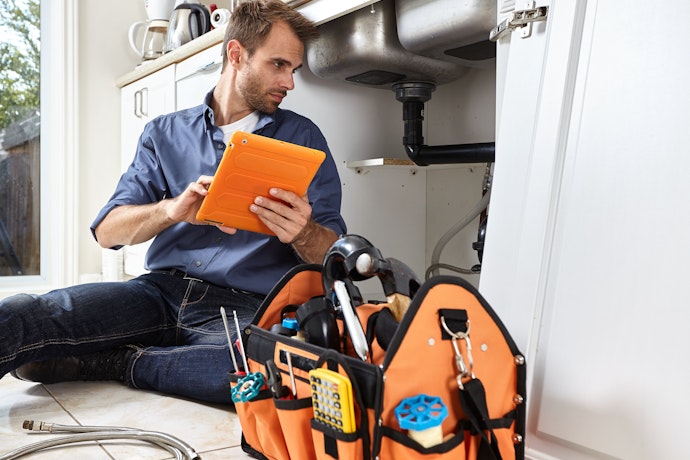How smart video fuels smart business
Learn how innovations in video powered by AI and machine learning are helping to reshape safety and efficiency for businesses.
Read more
Whether you work in HVAC, plumbing, landscaping, as an electrician or in another service-based field, it’s impossible to ignore the developments in artificial intelligence (AI) and machine learning and the effect they could have on the future of your industry. Though technology like driverless vehicles has yet to become commonplace, the potential implications of this far-off reality have raised deeper questions about how AI will impact field service in years to come.
The predicted industry shifts that will be made possible by AI and machine learning within the next ten years are leaving many owners with more questions than answers, new obstacles to overcome and more worries about the long-term viability of their businesses. Additionally, although autonomous vehicles are the hot topic of conversation, and many companies in field service are internally counting down the amount of time until their way of life is completely changed, this change is far from a near-future scenario.
However, no matter how far into the future people speculate this paradigm shift in the way we operate and track mobile assets, communicate with workers in the field, or make decisions that can impact the bottom line in real-time, AI has already had a massive impact on the way we do business on a daily basis today, and machine learning is already making its mark on the industry.
We’re taking a closer look at how AI is already impacting field service today and how owners can use technology to prepare their business for the future.
Surprisingly, driverless vehicles aren’t the only use for AI in the field services industries. Major changes in field service brought about by AI technology are already happening and in regular practice. The implications of tracking mobile assets in real-time and improving on a day-to-day basis might seem like old news to many owners, but the ability to share accurate information across business functions, clients and workers has revolutionized the expectations of how fleets operate and communicate.
For instance, it wasn’t long ago that owners only had vague insights to help interpret critical events reported from telematics monitoring systems. Today, machine learning, which is the type of AI that “learns” based on historical data by identifying patterns like harsh braking incidents and other driving behavior, is already having a positive impact on the safety of operations across the industry. Machine learning currently helps businesses improve worker behavior and mitigate liability and risk to their business by providing them the visual context of harsh driving events occurring with their vehicles.
The additional technology offered by in-cab video with dashcams can help increase operational efficiency and make a positive impact on the bottom line. While it might not seem like a paradigm shift from previous protocols, dashcam technology, and smart video analysis are already making a significant impact on many companies. Video safety surveillance gives the context necessary to reach a well-evaluated understanding of a worker’s actions – an understanding that might not be possible when relying simply on data from an alert triggered in a complex situation.
Some of the best business lessons come from seeing how companies handle the same challenges you face every day and how they currently solve common distribution problems to keep their business sustainable by increasing productivity, optimizing routes and keeping workers accountable on a full-time basis. Those organizations that use available data in an actionable way will be the survivors, and those who ignore industry progress through technological integration will slowly lose out on new opportunities.
Statistical analysis of operational efficiency data is as much an art as it is a science. With so many variables to consider, including human and machine elements, refining the way owners manage their people, as well as their equipment, in real time is imperative. Understanding behavioral changes and having the opportunity to engage the problem directly with a worker to course correct before infractions mount up, or accidents happen, is a major benefit of AI- and machine learning-enabled technology throughout field service.
Advances in AI and its impact on every industry show no signs of slowing down. The new normal in service is over-communication, transparency, and complete visibility. While many workers are sticking to time-honored methods of customer relations, the expectations of what constitutes “above and beyond” service are evolving as quickly as the technology that plays an integral part in day-to-day workflows. To offer excellent customer service, businesses must evolve as quickly as the definition of that term.
AI is making businesses smarter and more efficient, cushioning the bottom line for many companies and helping them proactively avoid problems instead of reacting to incidents that could otherwise have been avoided, such as unexpected downtime and consequential delays.
Overall, those field service businesses that can adapt their technologies and day-to-day work as artificial intelligence continues to become more ingrained in the industry will have a much easier time keeping up with the best-in-class competitors or will risk losing out on valuable business.
Tags: Cost control, Customer Service, Data & Analytics, Dispatching & Scheduling, Field management, Fuel cost management, Performance & Coaching, Productivity & Efficiency, Revenue & ROI, Routing, Safety, Team Management, Training, Vehicle & asset security




Find out how our platform gives you the visibility you need to get more done.
Learn how innovations in video powered by AI and machine learning are helping to reshape safety and efficiency for businesses.
Read moreAre you ready for vehicle tracking? Go through our checklist to learn the signs you’re ready to add fleet tracking to...
Read moreLearn how AI, machine learning, and predictive analytics is improving fleet accurating and cutting costs.
Read moreLearn how telematics can lead to operational improvements.
Read more